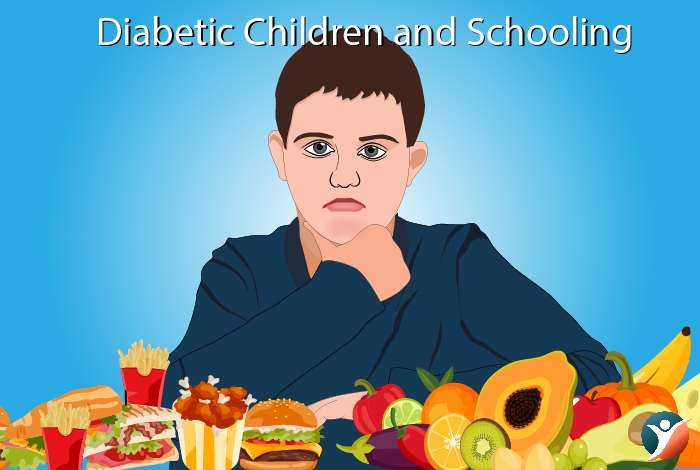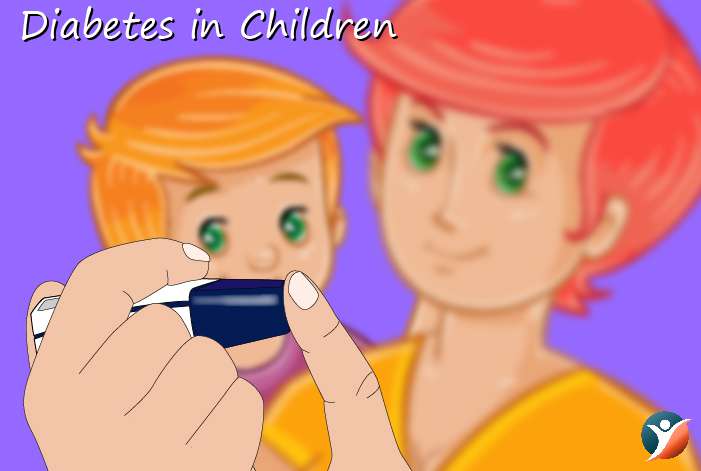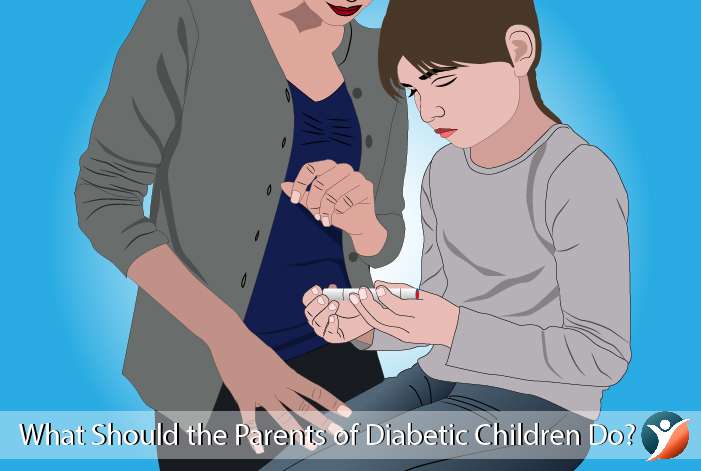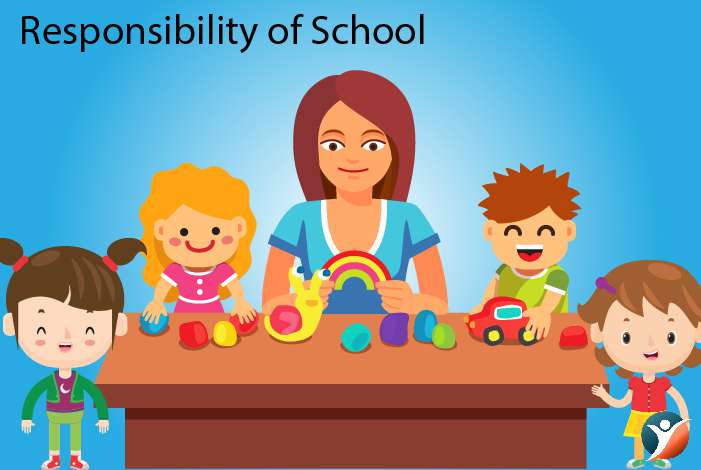
Diabetic Children and Schooling – The Role of School and Parents

Diabetes has become a common disease and is increasing among children at an alarming rate. The children are not aware of the outcome of this disease, so role of school and parents becomes essential.
In the younger generation, this disease is known as ‘juvenile diabetes‘. The diabetic symptoms are quickly visible in children as compared to adults. Both types of diabetes are found in children, if a child is suffering from type 1 diabetes, it means that beta cells present in the pancreas have been destroyed. On the other hand, type 2 diabetes may happen due to family history. Mostly, it is noticed that children who suffer from type 2 diabetes are overweight. Some children may be suffering from diabetes due to the family history. This needs an active role of school and parents for managing diabetes level.
Read the article to learn what is the role of school and parents in dealing with the diabetic children.
Table of Contents
- Diabetes in Children
- What Measures Can be Taken?
- What Should the Parents of Diabetic Children Do?
- Responsibility of School
- Conclusion
Diabetes in Children

With the change in lifestyle and eating habits, an increase in the number of children suffering from diabetes is observed. Most of the times, children suffering from diabetes are not diagnosed in time. This is due to lack of awareness and a common assumption that diabetes affects adults and not children. It is noticed that 90% of childhood diabetes cases are of Type 1 diabetes, where children are dependent on insulin for survival. With an increasing rate of diabetes among children, obesity has also become one of the common reasons for increase in juvenile diabetic cases. So, the role of school and parents can deal with the situation.
Both, type 1 and type 2 diabetes are found in children. Until recently, type 1 diabetes was commonly found in children but now the cases of type 2 diabetes are also noticed in abundance.
Type 1 is an autoimmune disease in which children depend on insulin for survival. On the other hand, Type 2 is due to insulin resistance which is common in obese children or kids with a family history of diabetes.
All the parents are aware of the fact that babies and small children sleep and drink a lot. But if the child has suddenly started sleeping too much or gets thirsty frequently, it is a matter of concern. These are the common signs of diabetes noticed in the diabetics at the initial stage. Such a condition must not be ignored and the child must be taken to doctor for further tests. If the child is diagnosed with diabetes, it takes time for the family to get back to new normal life. In such a situation role of school and parents is essential.[1]
There are two types of diabetes that can be recognized through different symptoms, such as:
Type 1
Under this condition, insulin is not produced in the child’s body. This is also known as insulin-dependent or juvenile diabetes. Due to Type 1 diabetes, different symptoms can be noticed in a child, such as:
- Fatigue: As the body cannot use glucose for energy properly, a person gets tired soon. It becomes difficult for them to participate in any physical activity due to which they feel uncomfortable among their friends.
- Need to pee a lot: Kids with high blood sugar levels need to pee more because the kidney responds to high levels of glucose in the blood by flushing out the extra glucose in urine.
- Extreme hunger and unexplained weight loss: When child’s muscles and organs fail to receive enough energy, he might feel extremely hungry which results into increased appetite. Still, if the child is losing weight, it should not be ignored.
- Unusual behavior: If your child is becoming moody or restless and also has the symptoms mentioned above, it could be a cause for concern.
Type 2
Insulin is produced in the body of a diabetic child but the body does not give a proper response. This is the case of insulin resistance when glucose is inadequate in entering the cells and supplying energy. As a result, the blood sugar level is raised and the pancreas put more efforts to produce insulin. Finally, the pancreas is not able to produce enough insulin for keeping the blood sugar levels according to the set standards.
Symptoms:
This type of diabetes is mostly found in children who eat a lot of sweets and do not participate in any of the physical activities. In this case, parents can notice the following symptoms and consult a doctor for child.
-
- Increased Urination: Elevated glucose levels force fluids from the cells and increase the amount of fluid delivered to the kidneys. This makes the child urinate more and the body becomes dehydrated.
- Fruity smelling breath: Do not ignore if your child’s breath smells fruity as it can be due to excess of sugar in the blood.
- Thirst: As the children need to pee again and again, the body gets dehydrated and they become thirsty. Increased thirst is another common symptom of diabetes.
- Blurred Vision: Due to high glucose levels, there can be swelling of the lens in the eye which leads to blurred vision. It should not be ignored as it can lead to other eye related problems.[2]
What Measures Can be Taken?

When a child is diagnosed with diabetes due to any reason, it becomes a great concern for the parents. Initially, it becomes difficult for them to understand how to support their child. As kids, they do not understand the consequences of the disease. at this stage, role of school and parents is vital. In such a condition, the parents must take proper steps in order to maintain the blood glucose level:
- Children must drink water instead of sugary drinks like pop, juice, iced tea and slushies.
- Junk food must be replaced with healthy snack choices, such as fresh fruits and veggies.
- Replace online games with outdoor games like soccer, swimming, baseball.
- Reduce sedentary time and get moving: walk, bike or play as much as possible.
- Reduce watching television and go out to play.
- Follow a routine that helps children to get enough and good quality sleep.
Young kids do not have any understanding of the disease and may feel scared at the time of blood tests and medicines. At such times, they will not co-operate with parents and may get angry. When they grow up, they may feel uncomfortable among their peers and demand for a more carefree lifestyle like their friends. Being a parent, you won’t be able to give them that freedom as diabetes does not allow it. In case, if they faithfully follow the treatment schedule, they might feel frustrated. This frustration can be due to the natural changes in the body during puberty that makes the situation harder to control diabetes. Hence, role of school and parents is important in a diabetic child’s life.
What Should the Parents of Diabetic Children Do? (Role of School and Parents)

Role of school and parents is important in order to deal with the disease. The diagnosis of diabetes can be a harder blow for the parent as compared to the child. Undoubtedly, diabetes is a chronic condition that needs close attention. As a parent of a diabetic child, it can be difficult for you to cope with the situation but you can be the best partner to make him learn how to take care of himself.
The diabetic children are not aware of the consequences of the disease. Neither, do they check the blood sugar level nor do they take insulin due to social stigma in school. They feel embarrassed, inadequate and insecure in comparison with peers because of being diabetic. So as parents you have to be strong and you have to fulfill a lot of duties. As a parent your role is to:
- Offer your child a balanced and healthy diet
- Check blood sugar levels of your child at regular intervals
- Provide insulin injections or use an insulin pump
- Do not ignore any signs of complications and other health problems related to diabetes
- Pay attention to the sugar amount and starches present in the food that your kid eats in his or her meals
- Ensure your kid exercises regularly as it helps to control blood sugar levels and also avoid the long-term health problems caused by diabetes
- Encourage your child to take part in organized sports or neighborhood games which are great to get kids moving and active. It is advised to limit the television time and motivate him or her to play outside.
It is recommended that the parents must not adopt a high demand approach. There must be no strictness as it can have a negative effect on the children. The children must be encouraged to eat healthy food and exercise on daily basis.[3]
The role of school and parents must be to encourage the children for leading a normal life without excessive restrictions due to diabetes. If there are limits, it makes the kids embarrassed in social life. As a precaution, parents must regularly check the blood glucose level and know how to manage hypoglycemia.
In today’s life, blood sugar level monitoring systems like Glucometer is one of the easiest methods to track and keep a record of glucose levels. These are attached to insulin pumps and has made it easy to manage insulin on time. After a certain age, children can also learn to operate it and test the sugar level on their own.
The parents must help the children to adopt healthy habits. It is a fact that the children who follow a well-balanced diet and limit their intake of sugar are less likely to become overweight. Always keep a watch on the weight of your children as overweight kids are more likely to develop diabetes. They are advised to follow different measures in an attempt to keep diabetes in control.
If you have a question in mind about how to treat type 1 diabetes? Understand that there is no cure for diabetes but it can be managed. The treatment of diabetes means to have a good control over it to minimize symptoms and prevent health problems. This effort of parents helps the kids to have normal physical, emotional, mental life. For social growth and development, they need to check the blood sugar level at the regular interval.
In order to control type 1 diabetes, children must follow certain measures. They must regularly participate in physical activities, take insulin as prescribed, check blood sugar levels and take healthy and balanced diet (considering the amount of carbohydrates in each meal).
In case your child is suffering from type 2 diabetes, you need to pay more attention to what they are eating and doing. They must take insulin shots or medicines that help insulin work better in their bodies. If they are suffering from other problems related to diabetes, get treatment for other health problems, like high blood pressure. The parents must take their children for regular checkups with doctors. After checking the blood sugar level, the doctor will decide if they need to continue the medicine or not.[4]
Responsibility of School

Children spend their most of the time in school. It becomes the duty of schools also to put some efforts to protect children from diabetes. Over recent years, it is noticed that less sport is played in schools. In place of outdoor games like football and baseball, children prefer to play games on Internet and PlayStation.
Besides this, kids also prefer to eat fast food that is cheap and easily available. This food has high calories and kids like to eat in more quantity. This has made the problem worse which needs serious and effective measures. To overcome it, schools must provide a good quality meal that is considered healthy for kids.
While sending diabetic children to school, parents often feel nervous. In such a case, it is important to educate kids about diabetes without making them worried or nervous about their health. It is the parents’ duty to make them understand how they can monitor and treat the disease based on their age and maturity.
At times when children are in school, they need to handle the situation on their own. In this case, they must know whom to contact for immediate help (such as a teacher, nurse, or coach). When the blood sugar level goes low, the children must have all the snacks ready to eat.
Also, parents must discuss everything when the child returns home. To make it easy for children, parents must inform the school about the medical history of the child. It is the responsibility of the school to:
- Participate in physical activity and school events
- Check the blood sugar levels
- Provide snacks when needed
- Take insulin and different other prescribed medicines for diabetes
- Provide healthy lunch at a fixed time
- Easily allow students to take breaks for water and bathroom
For diabetic children, teachers and other staff are responsible during school timings. They must have strong medical condition policy that must be executed in case of an emergency. For this, they need to train staff members and make the staff aware of the child’s health condition. This makes the role of school and parents important in a child’s life.
The American Diabetes Association (ADA) advises the school to offer a packet with general information about diabetes. This must provide details about how to identify and treat hypoglycemia and hyperglycemia. It must include contact details of parents, doctor, and team members of the diabetes health care. It is suggested that teachers and other school personnel must be trained to recognize the special needs of diabetic children. The training must be provided by nurses to volunteer teachers and support staff to perform the task.
In case a child is suffering from hypoglycemia or hyperglycemia, they should not be allowed to leave the class, or sent alone to get the treatment. Due to hypoglycemia, a child might feel dizzy or unsteady and can fall down anywhere. So, they should be allowed to stay wherever they are and must be provided with the best medical facility. Diabetic children must always be allowed to go to the toilet whenever they feel the need. The school staff must also provide them with extra insulin and be ready to call the ambulance, if the need arises.[5]
Conclusion
To live with diabetes becomes a challenge for all the diabetics of any age. It is really difficult as it gives them an odd feeling among their friends. Due to this insecurity, they might be angry, scared, and uncooperative. Looking at their friends’ lifestyle, they might demand more freedom which diabetes does not allow them. Even while following the treatment schedule, they might get irritated when the natural body changes of puberty make it difficult to control diabetes.
We hope you like the article. In this article, we have tried to cover up all the important points to make it easy for you to understand the problem faced by your child. We will come up with more updates regarding the role of school and parents. In case we missed out anything, leave the suggestions.




